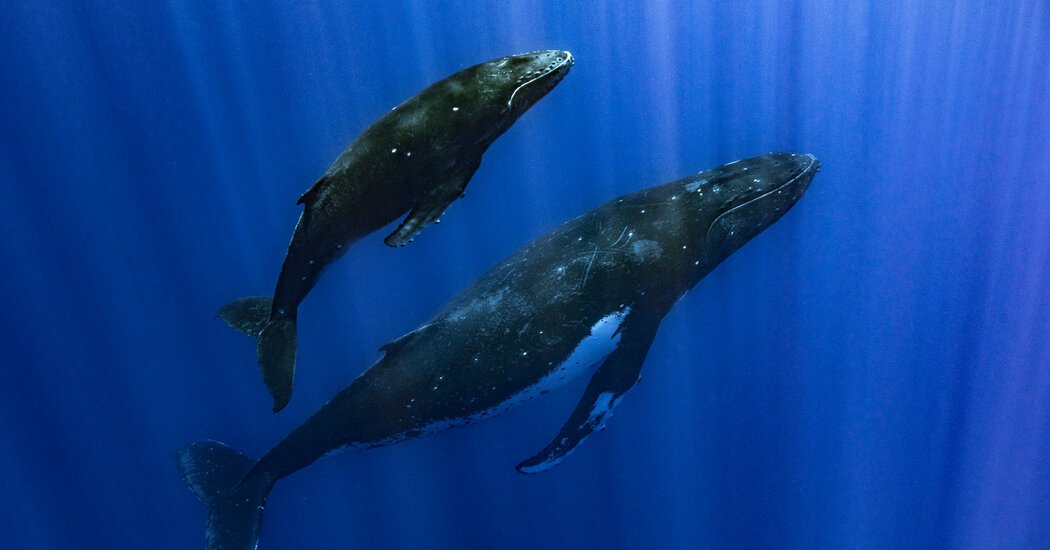For many Indigenous groups across Polynesia, whales hold an ancient sacredness and spirit that connects all life. Whales — or tohorā, as Māori call them — guided their ancestors across the Pacific Ocean. Today, those groups consider themselves to be guardians for the largest animals under the sea.
But as of Wednesday, whales are not simply animals in this region.
Indigenous leaders of New Zealand, Tahiti and the Cook Islands signed a historic treaty that recognizes whales as legal persons in a move conservationists believe will apply pressure to national governments to offer greater protections for the large mammals.
“It’s fitting that the traditional guardians are initiating this,” said Mere Takoko, a Māori conservationist who leads Hinemoana Halo Ocean Initiative, the group that spearheaded the treaty. “For us, by restoring those world populations we also restore our communities.”
Conservationists have good reason to believe they will succeed: In 2017, New Zealand passed a groundbreaking law that granted personhood status to the Whanganui River because of its importance to Māori, New Zealand’s Indigenous people.
The treaty, or He Whakaputanga Moana, which translates to “declaration for the ocean,” was signed on Rarotonga, the largest of the Cook Islands, in a ceremony attended by Tūheitia Potatau te Wherowhero VII, the Māori king, and 15 paramount chiefs of Tahiti and the Cook Islands.
In a statement, the Māori king said that as “the songs of our ancestor” grow fainter, the treaty “is not merely words on paper.”
“It’s a Hinemoana Halo,” he said, “a woven cloak of protection for our taonga, our treasures — the magnificent whales.”
The significance of whales to Māori and other Indigenous groups is twofold, said Ms. Takoko, who wrote about the initiative in the climate and culture magazine Atmos. First, they believe they can trace their ancestry directly back to whales, and second, whales were key to developing the Māori system of navigation as people followed whale migrations from island to island.
“Without the whale, we actually would have never found all of these various islands of the Pacific,” Ms. Takoko said.
A number of types of whales are found in the Pacific Ocean, including blue, gray, minke, sperm, southern right and, of particular importance to Māori, humpback. And while there is some protection for the mammals within the Southern Ocean Whale Sanctuary, where the International Whaling Commission has banned all types of commercial whaling, there is no formal legislation.
Ms. Takoko said the treaty would allow her team to start talks with governments in New Zealand, the Cook Islands, Tahiti, Tonga and other Polynesian countries to develop a legal framework to enforce protections around whales.
While climate change is considered a significant threat to whales, encounters with large vessels can be fatal. About 10,000 whales are killed every year because of ship strikes, said Carlos Duarte, a marine ecologist and the lead scientist for the effort. Entanglement with fishing gear is also an issue, he said. The Southern Ocean Whale Sanctuary offers some protection, but whales will be whales.
“The problem with whale conservation is that the whales do not know all the boundaries,” he said. “They move freely around the ocean.”
New technology can help track their wanderings, Mr. Duarte said, including remote sensors and acoustics that can help conservationists and vessels locate whales underwater.
Legislation would be built around several pillars: monitoring, penalties for killing whales and even whale insurance. A $100 million fund would back the initiative.
“When you recognize a whale as a legal person — that doesn’t mean they’re human — they’re a legal person, meaning you can endow them with certain rights,” said Ralph Chami, the project’s head economist. “And with that comes a responsibility that if you hurt or bring harm to a whale, then there are remedies.”
Mr. Chami has estimated that if one were to track a whale over its lifetime and factor in the unwanted carbon that it removes from the atmosphere, one whale would be worth about $2 million. And if a vessel — shipping, fishing or otherwise — were to hit one, there would be fines and premium adjustments.
To mitigate costs, Mr. Chami said, insurance companies would require ships to have monitoring or anti-collision devices to help reduce the probability of hitting a whale.
Now, Ms. Takoko and her team will try to persuade world leaders to follow suit.
She said the document would allow her team to start talks with governments. She has already begun conversations with officials in Tahiti, Tonga and the Cook Islands, and said the Māori king had addressed some members of New Zealand’s Parliament. Legal experts from the United States and Europe are also joining the effort, she said.



